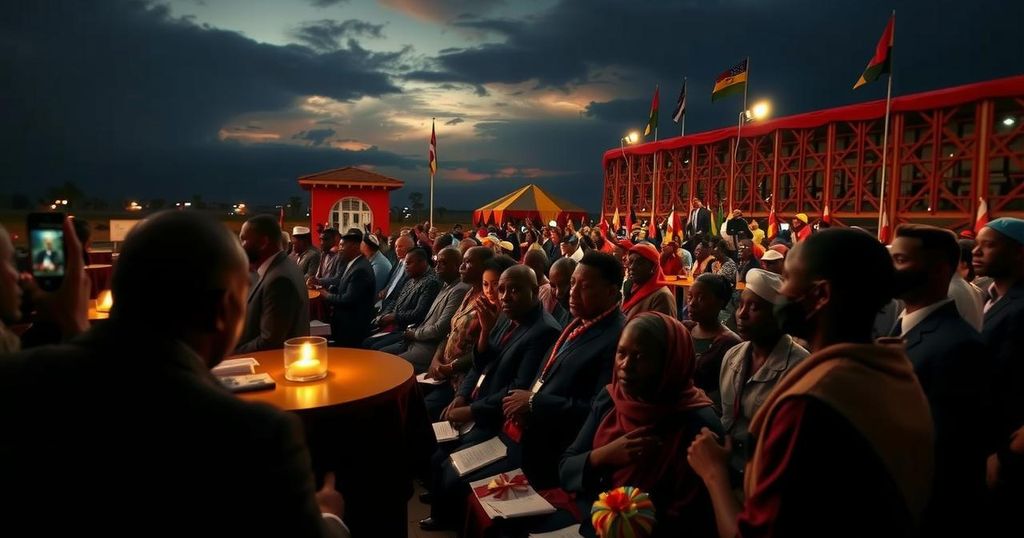Namibia’s upcoming election poses a significant challenge for SWAPO, the ruling party since independence. Facing high unemployment and youth disenchantment, the party must navigate a divided opposition while adapting to a changing electorate characterized by a youthful demographic calling for change. This election may result in either a continuation of SWAPO’s dominance or the election of the country’s first female president, reflecting broader regional political trends.
As voters prepare to cast their ballots in Namibia on Wednesday, the South West Africa People’s Organization (SWAPO) faces a pivotal moment in its political history. With unyielding economic challenges, including high unemployment rates and a housing crisis, SWAPO’s support, which has prevailed since Namibia’s independence in 1990, is now under significant scrutiny. The disenchantment among voters, particularly the youth demographic, threatens the party’s long-standing electoral dominance, echoing sentiments seen in neighboring countries where historical liberation parties have suffered electoral losses.
This electoral test arises against a backdrop of regional political transformations. In South Africa, the African National Congress lost its parliamentary majority for the first time since the end of apartheid. Similarly, Botswana’s Botswana Democratic Party relinquished its presidency after nearly six decades in power. The growing discontent within the populace presents a formidable challenge to long-standing ruling parties, including SWAPO, which must now grapple with the aspirations and frustrations of a younger generation.
Analysts underscore that the youth, composing over 40 percent of Namibia’s registered voters, are increasingly pivotal in shaping the electoral landscape. This demographic is becoming disillusioned with the independence era narratives, focusing instead on contemporary issues like employment and economic stability. Despite SWAPO’s attempts to engage this youth vote—such as hiring popular musicians for their rallies—turnout among younger voters remains uncertain, as noted by experts who highlight that registration does not guarantee voting.
As Namibia faces a dire housing shortage and persistently high unemployment—reportedly affecting a third of the population—the call for change grows louder. Political analysts believe that the nostalgia of prior liberation movements may no longer suffice to rally voters who are struggling for basic needs. However, the diversity of opposition candidates and potential divisions among them could inadvertently favor SWAPO.
This election harbors historical significance, as Namibians may either elect their first female president with Netumbo Nandi-Ndaitwah, the current vice president and SWAPO’s candidate, or usher in change with the opposition. The electoral process, necessitating a majority for a first-round victory or leading to a runoff for the top two candidates, presents a unique moment for democratic engagement in Namibia.
In summary, the Namibian election stands at a crossroads where long-held political legacies confront the fervent desires of a younger, more diverse electorate grappling with pressing social issues. The results, anticipated within days, will deliver crucial insights into the country’s political future and voter sentiments.
The upcoming electoral event in Namibia represents a significant moment as the country prepares to evaluate the political landscape shaped by SWAPO since its independence. Voter dissatisfaction has surged in southern Africa as citizens express frustrations over economic mismanagement, high unemployment, and social inequities. This political climate reflects a broader trend observed in nations where former liberation parties face considerable challenges against emerging opposition forces. Namibia, with its youth-heavy electorate, is at the forefront of these changing dynamics, of which the implications of this election could resonate throughout the region.
The impending election in Namibia will serve as a critical indicator of the electorate’s dissatisfaction with long-standing governance, particularly as SWAPO encounters intensified competition from younger voters and divided opposition. The outcome, whether maintaining SWAPO’s dominance or heralding a shift in leadership, could signify deeper transformations in the political landscape of southern Africa. Increased civic engagement and youthful aspirations herald a potential turning point in a region grappling with the legacy of its past and the quest for a more equitable future.
Original Source: www.nytimes.com






